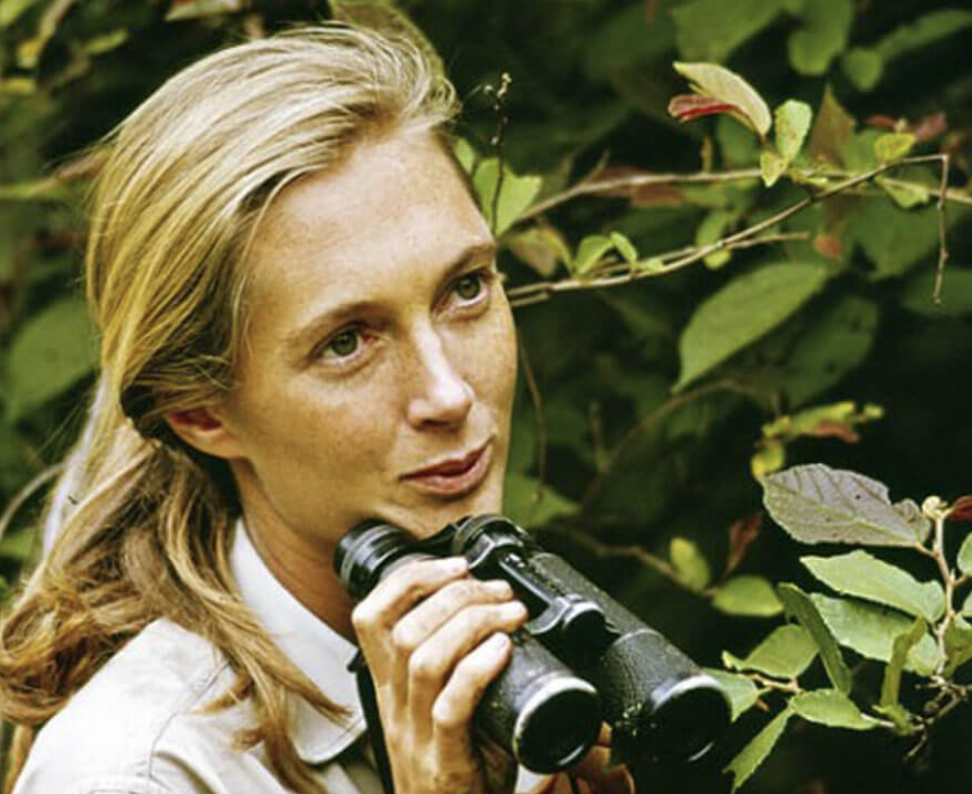As Dr. Jane Goodall turned 90 this spring, she shared her 9 Life Lessons from her nine decades of life, and 7 decades of impact work. Of course we know her as the iconic figure in conservation and ethology, that has continued to speak on the need for our healthy coexistence with the natural environment. She has written books, done many thought provoking talks, and even has a Barbie modelled after her.
"Not only [are we] part of nature, we depend on it"
Dr. Jane Goodall

Drawing from her extensive experiences and the profound life lessons she has shared, there is something we can all learn from her in the business world. Lessons that inspire actionable guidance to embrace sustainability into their core strategies. Below, we explore how Dr. Goodall’s nine life lessons can inspire transformative changes in business.
1. Work Hard for Sustainability
Goodall’s commitment to her work reminds us that persistence is key. Businesses should be relentless in their pursuit of sustainable solutions (just like they are of profist), constantly seeking out and investing in innovations that protect the environment, recognizing that nothing happens overnight, and that the only insurance for long term change is long term commitment.
2. Find Common Ground
In the context of business, this lesson translates into collaboration. Engaging with stakeholders, including suppliers, customers, and competitors, investors on common sustainability goals can lead to broader impacts than working in isolation. At the end of the day no one person and no one business will change the world, we will all do it together.
3. Empathy Towards the Planet
Empathy in business goes beyond understanding customer needs and employee motivations—it extends to recognizing and mitigating the impact of business operations on the planet. This requires a deep appreciation of how ecosystems work and how business practices can disrupt or support these natural processes. It's about making decisions that prioritize environmental health, which in turn, secures the long-term sustainability of the business itself.

4. Supportive Environments Nurture Growth
Just as supportive parenting is crucial, businesses can foster supportive environments that encourage employees and partners to innovate and engage in creating better solutions, better businesses, better cultures. Empowering employees through education and participation can spark enthusiasm and creativity in addressing the biggest of challenges.
5. Embrace Change
Embracing change is essential for survival and growth. Dr. Goodall’s lesson here encourages businesses to be proactive rather than reactive, after all change is inevitable. This might mean transitioning to a more circular model, adopting cleaner technologies, or redesigning products for better environmental performance. Companies should be (NEED to be) open to pivoting towards more resilient and future facing models and practices, even if it means overhauling the way things have been done or existing strategies.
6. Everyone Can Make an Impact
Everyone has an impact, every business has an impact and every business decision shapes our world. From sustainable procurement practices to ensuring fair labor practices and designing for product end-of-life, each choice has environmental, social, and economic consequences. Businesses need to cultivate a mindset where every team member from the CEO to the cashier understands their role in the company’s sustainability efforts and is equipped to make decisions that align goals leading to a better world.
7. Authenticity in Leadership
True leadership in sustainability means setting an example through genuine and transparent actions. Businesses that lead by example, showing commitment to their values, can inspire not only their employees but also their industries, peers and consumers to follow suit.
8. Everything Happens for a Reason
This lesson invites businesses to reframe challenges as opportunities. Regulatory changes, market shifts, and climate crises can be seen as chances to innovate and improve. For instance, a new regulation on emissions can prompt a company to revamp its processes, potentially leading to efficiencies that save money in the long run. By adopting this mindset, businesses can turn adversity into advantage, staying ahead of the curve and positioning themselves as leaders in sustainability.
9. Actively Seek Solutions
Feeling overwhelmed by the scale of environmental (and other) issues can be paralyzing for people and businesses alike - strategies moving forward and solutions are complex. Remember you don't have to do it all at once, focus on taking actionable steps, no matter how small to get you moving on this path to building a better company.

Without a doubt, it's easy to get caught up in the doom and gloom of climate change news and environmental business reports, but here’s a twist - imagine sustainability as less of a solemn duty and more of a journey that you take with many other people that takes time and effort. Its not just the shiny object of the year that you discard when you are done with it.
Every decision counts, from the mundane to the monumental, and as Dr. Jane teaches us, it’s about persistence, empathy, and authentic leadership. It's about turning what many see as limitations into opportunities to innovate and thrive. Think about it: every great business story has a bit of drama and a lot of overcoming adversity—so why should the narrative of sustainability be any different?
If Dr. Goodall, at 90, still has the energy to champion the cause of nature, surely all of us in business, innovation and capital can all channel a bit of her impact driven spirit into our business practices.
So, as we go about our business, let’s ask ourselves: What Would Jane Do?

No Comments.